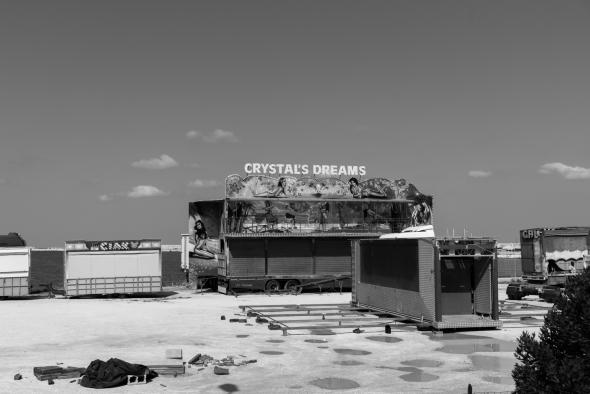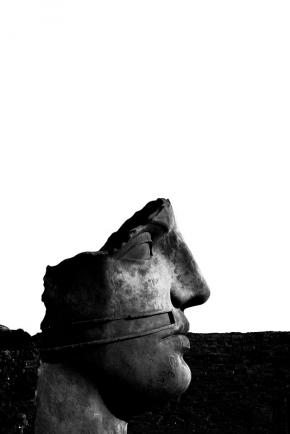Breathing Prohibited
A response to Achille Mbembe’s “The Universal Right to Breathe”.
This conversation takes its initial steps from Achille Mbembe’s recent reflection on the current moment that humanity lives in light of the outbreak of COVID-19 pandemic. It was developed on the initiative of Luanda-based poet and art curator, Marcos Jinguba, in collaboration with the Italian photographer Andrea Ciccarese.
 Marsico – Down on the street. Andrea Ciccarese
Marsico – Down on the street. Andrea Ciccarese
MJ: In response to/inspired by the article by Achille Mbembe which reflects on the universal right to breathe, I propose to discuss, rather, the prohibition of breathing that became increasingly evident with the raging of the pandemic. I think that the legitimacy of obtaining oxygen is still questionable. For example, let’s take a look to what happened in Luanda. The government introduced mandatory laws that triggered an increasing use of violence and lots of fear among people. In certain cases, they caused numerous deaths among those who were caught not wearing mask. Elsewhere, protests arose over the scarcity of the masks along with that of essential goods.
AC: To bring Mbembe’s back, I think that the philosopher was addressing actually this issue that you are bringing forth, i.e. forbidden breathing, from the point of view of its solution. There was an activism involved in his observations, in my opinion. Mbembe seems to say that we need to defend and promote the legitimacy of breathing as a universal right which involves not only the humans but also other living species. In the article of Mbembe, there seems to be an appeal to pay attention to vulnerability and the effects of the current critical times that not only us as human being are living but also our entire ecosystem (on the verge to collapse, see the fires in California, for example).
MJ: Speaking of vulnerability. The world was faced with the Coronavirus and each state activated its defense system. However, we noticed that the cyclical problems of the states did not allow a good defense, in relation to this disease. How it looks at the distribution of health vulnerability, in the Italian, European and worldwide context.
AC: Italy can certainly rely on one of the most efficient health system. Italy was the first to declare its vulnerability and immediately respond to this enormous danger that would soon spread all over the world. Africa countries have poor health systems yet the fact of dealing constantly with deep economic, sanitary, political crisis, somehow it made them looking more prepared from a European viewpoint.
In response to this vulnerable moment, I noticed that art has served as a privileged tool for many people to express a feeling of unity and solidarity. In Italy, during the lockdown, balconies became the public stage for domestic musical performances. Children contribute to this kind of public activism making and sharing drawings with the quote “Andrà tutto Bene” (Everything will be fine). Artists, musicians, actors, start producing new contents for their audiences online, but what really strikes me was the domestic use of art during the pandemic. It seems like if art offered alternative ways to people to react to this emergency, almost as if there could be a universal right ‘to create’ in very difficult times.
 Pompeii. Andrea Ciccarese MJ: About the body exposed to the environment, in recent times, the human being has been seen as the explorer of fauna and flora to guarantee its existence. However, some human communities still preserve the love for the land, timidly. But the question is, where does humanity go pursuing this overexploitation of the land and environmental decay?
Pompeii. Andrea Ciccarese MJ: About the body exposed to the environment, in recent times, the human being has been seen as the explorer of fauna and flora to guarantee its existence. However, some human communities still preserve the love for the land, timidly. But the question is, where does humanity go pursuing this overexploitation of the land and environmental decay?
AC: As a photographer, I have never worked on projects concerning nature in the strict sense, or nature in relation to man. Over the years I have focused more on the intervention of the man who transforms the world in which he lives, with the consequences and the memories he leaves. Pompeii, for example, is a work on memory and human introspection, which starts from a physical place but where everything is generated by the eruption of a volcano, therefore by the unpredictability and the sovereignty of nature.
MJ: Isolation is an act that characterized this great moment of uncertainty that humanity lived, and we are increasingly asking ourselves about the usefulness of this word in artistic production. Personally, I was isolated for a long time, since the fear and panic about the virus was constant. In a certain way, this fear was not but became mine, as it was very well spread by the media. But then there was a period of accommodation to panic about the ongoing situation.
AC: For me, isolation is an essential moment in the artistic process. Of course, doing reportage photo becomes more difficult because you cannot go outside and travel, but…I could devote my time to reflect, think and refine what I’ve already done. At first, I felt a moment of stagnation and it took me a while to start again feeling my creative energies. I’ve been working in the last year on a project about a family of carousel-makers, so this led me to spend a lot of time traveling with them who usually move a lot, bringing carousels to any corner of Southern Italy.
Being a reportage photographer means being around, traveling and meeting new stories and new people, so naturally it was a difficult time. However, I think the moment of reflection when not taking photographs is equally important. I am a thoughtful and silent person and I claim this way of being also in the creative process of my projects. Remaining isolated is for me fundamental in the process of introspection and criticism.
MJ: Every culture involves the construction of collective memory and the words masks, hand washing, alcohol gel and various elements are part of the tales, novels, diaries and photographs that were taken at this stage. We can say that humanity has built a collective memory in common that will be able to determine the next times.
AC: Certainly, many artists have decided to show themselves and their art in this particular historical moment. I believe that their works will be important documents of this epoch and remain over time. As usual, the risk is the trivialization and overexposure of a topic. The artist, however, is a manifestation of himself, and it is right that everyone feels free to do and say what they want. Personally, however, I have seen few beautiful and many trivial things.
MJ: I don’t know if you agree, but the artist ends up being defined as a creative being submitted to the time he lives. The 17th century brought Enlightment as an artistic current, modernism in the 18th century and now, in the post-corona period, what it will see in artistic production for humanity.
AC: I think that every historical period has been defined by specific events and for sure, Coronavirus might be considered as a kind of event that will be able to mark and change the way people express their art. Yet, it is difficult for me to think this way. I would like to hear what you think about this aspect as a poet and a curator.
Certainly, the virtual dimension will take a new importance, also in light of the massive use of digital tools that this new reality brought with itself, but also in relation to the fact that artists might end up not traveling a lot like before…who knows! The art that will change is only in relation to travel and distance. What could definitely change might be the distribution channels, moving more and more into streaming and digital platforms…but I really hope that this won’t happen. The emotion that live art arouses is incomparable.